Dmitry Khmelnitsky
After the outbreak of full-scale war in Ukraine, EU countries expelled hundreds of Russian diplomats, banned Russian propaganda channels, and imposed visa restrictions and sanctions. It may seem that the way to Europe is now closed for Russian security services — but it is not. An important Kremlin outpost in the European Union remains Cyprus, a state with a reputation as an offshore zone and more than a hundred thousand Russians and natives of Russia and the former Soviet Union. Unlike most other EU countries, not a single Russian diplomat has been expelled from the island since the beginning of the war in Ukraine, and in 2022, the Russian embassy was headed by an FSB lieutenant general. The Dossier Center reveals how Russian influence in Cyprus works.
In October 2023, Rossiyskaya Gazeta correspondent Alexander Gasyuk was arrested in Cyprus — on suspicion of espionage. Gasyuk was caught red-handed while following a certain object and subsequently deported to Russia. When the journalist was detained, he was not alone — he was covered by an employee of the Russian embassy, Danil Doinikov, who even tried to wrestle him away from the officers of the Cypriot police, he was also detained. Gasyuk showed up in Cyprus in the spring of 2022, shortly after the start of the Russian invasion of Ukraine, and before Cyprus, he had worked in the United States and Greece. It was the American intelligence services who passed on to their Cypriot colleagues information about the journalist’s undercover work for Russian intelligence.
This deportation is perhaps the only notable attempt by the Cypriot authorities to thwart Russian intelligence services on the island. For example, the current head of the TASS office in Cyprus, Andrei Surzhansky, who came here with Gasiuk, is mentioned in the press as a member of the Foreign Intelligence Service.
While other EU countries expelled Russian diplomats for espionage by the dozens, Cyprus, although following the EU’s foreign policy course of war and support for sanctions, did not interfere with the activities of Russian diplomats and propaganda: the authorities restricted cable broadcasting of RT, but Russian channels are still available on the Internet. No Russian diplomats have been deported. In total, the Russian embassy and the «Russian House» in small Cyprus has about 300 employees, several sources familiar with the activities of the diplomatic mission told the Center «Dossier». They note that the number of diplomats has only increased since the war in Ukraine began. The number of all kinds of antennas on the roof of the embassy and the residential building belonging to it has also increased dramatically.
Even the Russian ambassador to Cyprus is a FSB general without any diplomatic experience. In September 2022, the Russian embassy was headed by FSB Lieutenant General Murat Zyazikov. He went «civilian» in 2002 when he changed his post as deputy directorate of the Federal Security Service in the Astrakhan region to deputy presidential envoy in the Southern Federal District, and two months later he was elected president of Ingushetia in a highly dubious election and served in that post until 2008. Later, Zyazikov held various government positions — he was an adviser to Dmitry Medvedev when he was president, and joined the Plenipotentiary Mission in the Central Federal District, but he was not connected with diplomacy in any way.

Murat Zyazikov. Photo: Caucasian Knot
Zyazikov’s connections with the security services were likely more important than his diplomatic career, especially at a time when diplomatic contacts in Europe have been minimized. Already in December 2023, Putin awarded Zyazikov the Order of Honor «For his great contribution to the implementation of the foreign policy course of the Russian Federation and many years of conscientious work».
Several factors can be inferred about Zyazikov’s work in Cyprus. For the first time in history, the Russian embassy opened a representative office in the Turkish Republic of Northern Cyprus, which is unrecognized by anyone but Turkey.
The second, much more noticeable factor is the flourishing of various cultural and patriotic events under the auspices of the Russian diplomatic mission. While many other EU countries are struggling with such propaganda, Russian diplomats are coming up with new and increasingly unexpected reasons for them. Traditional Soviet-Russian celebrations like May 9 were joined, for example, by an event commemorating the lifting of the Leningrad blockade on January 26. Moreover, on September 30, 2023, in front of the «Russian House» in Nicosia, a celebration was held in honor of the «annexation» of the annexed regions of Ukraine to the Russian Federation.
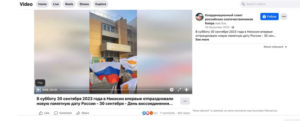 Screenshot: Facebook
Screenshot: Facebook
The grand opening of the Ayia Napa-Gelendzhik view park in November 2023 can be considered an unquestionable diplomatic success for Zyazikov and his subordinates: the Cypriot and Krasnodar resorts are twinned. Ayia Napa Mayor Christos Zanettou and other local officials participated in the event. This ordinary event for the pre-war situation could hardly have been held without serious work with Cypriot officials, whose participation in such a celebration was compromised: by May 2022, more than 150 cities around the world had already severed twinning relations with Russian cities. Judging by the rank of guests from among Cypriot officials at embassy events, the embassy’s recruitment activities are now reoriented from the top political elite, which has become particularly cautious due to circumstances, to local municipal authorities, and the celebration in Ayia Napa may be one example of such recruitment.
Russian Cyprus
For decades Cyprus has been attracting Russians. About 120,000 Russians from both Russia and the former Soviet Union now live on the island, half of whom have already obtained Cypriot citizenship. This is 10% of the country’s population — a significant political force capable of significantly influencing the situation in the state. They are also extremely well-to-do and often favorably disposed towards the Russian authorities.
This is primarily because the «golden passport» program that was in effect from 2002 to 2020 allowed hundreds of Putin officials, businessmen, and quite possibly agents of the Russian secret services to enter Europe. In total, about 2,900 Russians have received such passports. In addition, Cyprus has been a convenient place to store capital for Russian businessmen, including those close to the Kremlin: in 2018 alone, the outflow of investments from Russia to Cyprus amounted to almost $21 billion. This opened up opportunities to influence the politics of Cyprus and, as a consequence, the general policy of the EU countries: it was the Cypriot authorities who were the first in Europe — back in 2016 — to talk about lifting sanctions against Russia for the annexation of Crimea and its involvement in the war in eastern Ukraine. This picture is confirmed by the recent investigation by the International Consortium of Investigative Journalists into leaked documents from several Cypriot financial campaigns. In addition, Cyprus is a popular place of residence for retired or retiring Russian intelligence officers, such as former prime minister and former SVR chief Yevgeny Primakov, who spent much time on the island in the last years of his life. Not surprisingly, with such initial data, Cyprus has tightly entered the Kremlin’s sphere of interest and has become an important springboard for the work of the intelligence services against the backdrop of Russia’s full-blown conflict with Western countries.
The management of intelligence activities of various Russian agencies (FSB, SVR, GRU) is concentrated in the diplomatic missions of the Russian Federation — embassies and consulates. The main work with agents of influence among emigrants is carried out by a special agency, Rossotrudnichestvo, which is the successor of the Soviet All-Union Society for Cultural Communication with Abroad (VOCS). Rossotrudnichestvo has 85 foreign missions, and 72 Russian centers of science and culture, the so-called «Russian Houses,» which operate in 62 countries. Unlike embassies, «Russian Houses» are open to everyone and are extremely convenient for contacts with agents of influence and recruitment of new agents during all kinds of cultural events, and among their leaders you can find people with biographies that indicate a possible connection with the intelligence services. In many countries (for example, in Germany) around Russian embassies and «Russian houses» all sorts of pseudo-public organizations are concentrated. They are created on Moscow’s initiative, and their activities are controlled, planned, and financed either by Moscow directly or by the embassy and Russian Houses.
Each such organization works with its target group, and in general, they strive to cover all social, age, ethnic, and religious groups of «compatriots» in the country. In small Cyprus, their activities are visible, and they and their members play a much more significant role in the social life of Russian migrants than, for example, in Germany.
All of them can be divided into several groups. The first includes central organizations of emigrants («compatriots») created in Moscow, which have representative offices in all countries with a Russian diplomatic presence. The second includes associations of Russian businessmen. The third includes Cypriot organizations demonstrating friendly feelings and ideological closeness to Russia. The fourth is cultural and educational associations of Russian migrants, including several Russian schools.
The fifth group is formed by representatives of the Russian Orthodox Church of the Moscow Patriarchate: the Russian Orthodox Church has only one parish in Cyprus (headed by the rector Pavel Povalyaev, who fled Ukraine in 2014), but it has close ties with the Cypriot Orthodox Church. Three of the seven Cypriot bishops graduated from seminaries in Moscow and Leningrad. The Russian Orthodox Educational Center in Cyprus, which has been owned by Valery and Natalia Zykova since 1997, is also of interest from the point of view of connections with special services. The organization is funded by the Russian Orthodox Church and the Russian World Foundation, and the biographies of its leaders resemble the career paths of agents of the Russian secret services: Zykov studied at the Ryazan Higher Military Command School of Communications, and his wife, an English teacher by profession, served in the armed forces in 1980-1985.
There are also quite exotic organizations, such as the Cypriot branch of the Imperial Orthodox Palestinian Society (IPPO). The society under this name, which was engaged in organizing pilgrimages to the Holy Land, existed in Russia before the revolution. It was restored in the 90s under its former name, and in 2007 it was headed by FSB Colonel General Sergei Stepashin, who in different years served as Director of the FSB, Minister of Justice of the Russian Federation, Prime Minister, and Head of the Accounts Chamber. The official task of the IPPO is the same as before — pilgrimages to Jerusalem, about which now, of course, is out of the question. The visible part of IPPO’s activities is limited to organizing twinning between Russian and Cypriot cities, while the invisible part can only be guessed at.
The most influential of the central emigrant organizations created by Moscow is CCRC, the Coordinating Council of Russian Compatriots of Cyprus, which has been working on the island since 2008. It is a local branch of the World Coordination Council of Russian Compatriots Living Abroad, established in 2001 in Moscow for the ideological consolidation of Russian emigrants. The first chairman of the Cyprus CSRRC was Igor Nosonov, chairman of the board of directors of the publishing house Vestnik Kipra, a resident of the island since 1996. In 2007 he also became 2007 the chairman of the Association of Russian-speaking residents of Cyprus «Horizon», organized on the initiative of the Russian Center of Science and Culture and the publishing house «Vestnik Kipra». From the very beginning, the main task of the CCRC was to collect information about all Russian-speaking residents of Cyprus, files on which were kept in the embassy, Nosonov personally admitted to a source working for the «Vestnik Kipra». Since 2022, the chairman of CCRC Cyprus has been Dmitry Apraksin, a computer programmer and since 1994 a lecturer in computer science at a university in Nicosia. Apraksin graduated from the Moscow State University of Management in the mid-80s and came to Cyprus in the very early 90s, according to his former students, who already knowing Greek. Apraksin is an obligatory participant and leader of all patriotic events in Cyprus. In October 2023, on behalf of the 120,000-strong Russian-speaking community of Cyprus, he handed Ambassador Zyazikov an appeal to Putin to run for the 2024 Russian presidential election. The CCRC office was originally located at the Russian Embassy in Nicosia but later moved to the premises of the Vestnik Kipra.
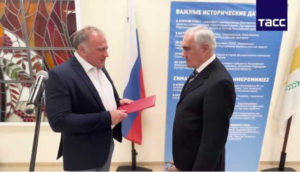
Dmitry Apraksin hands the Russian ambassador an appeal for Vladimir Putin’s nomination. Photo: TASS
To control the Russian press abroad, a special organization was created in Moscow in 1999 — the World Association of Russian Press (WARP), which supports and finances Russian-language publications abroad, and the WARP Foundation, created in 2014, which performs roughly the same tasks as Russkiy Mir Foundation, but only in the field of the press. Sergei Naryshkin, head of the Russian Foreign Intelligence Service, is chairman of the foundation’s board of trustees.
There are at least two WARP members in Cyprus: Natalia Kardash, head of the publishing house Vestnik Kipra, and Andrei Avsitidijski, publisher of the pro-Kremlin weekly Europa-Kipr, a breakaway from Vestnik Kipra.
Kardash is a member of CCRC and numerous other pro-Russian associations and unions. Among other things, she is on the board of the European Russian Alliance (ERA), an organization that emerged from a failed attempt by Russian security services to create the first «pan-European» party with the working title «Russian Party of Europe.» The ERA has survived in the form of a «social movement», which since 2007 has been led by Tatyana Zhdanok, a member of the European Parliament from Latvia, whose work under the supervision of the FSB since at least 2004 has been the subject of an investigation by The Insider. Kardash’s newspaper Vestnik Kipra has been published since 1995 (she has been with the Vestnik since 2001); the publication later acquired many satellites.
Another publication with close ties to the Russian authorities is Cyprus Butterfly, Cyprus’ third most popular Russian-language online publication and an information sponsor of the Russian Embassy. Behind him is Duma (Russian parliament) deputy, deputy chairman of the Duma Defense Committee, Interior Ministry Colonel Yuri Shvytkin, says Boris Demash, editor-in-chief of the Cyprus Daily News.
Russian business
A separate group consists of associations of Russian-speaking businessmen, which are extremely important due to the large number, influence and wealth of their members.
Chronologically, the first such organization (and the most influential one for almost three decades) was the Association of Russian Businessmen in Cyprus, founded in 1995 by Yuri Pyanykh, a man with a very characteristic biography. After graduating from the Moscow Institute of Physics and Technology in 1976, he worked «in various positions in the USSR Foreign Ministry.» He served in Cyprus since 1987 as first, and second secretary and economic counselor of the embassy. In 1992, Pyanykh suddenly turned into a businessman and headed the Cyprus branch of ITERA, which belonged to oligarch Igor Makarov.
Pyanikh’s biography suggests that he may be connected with the Russian security services and first worked for them under diplomatic cover, and then for decades looked after Russian business in Cyprus on behalf of the Russian government, but as a Cypriot businessman. Pyanikh is an expert on the intergovernmental Russian-Cypriot commission on Economic Cooperation, a member and creator of the Cyprus branch of CCRC, a participant and organizer of a mass of propaganda and cultural events of the Russian diaspora.
In 2020, Pyaniye’s organization has a competitor: Natalia Kardash in addition to the magazine «Successful Business» (part of the Publishing House «Vestnik Kipra») created the «Successful Business Leaders’ Club». As stated in the club’s advertisement, «in small groups in an informal atmosphere they discuss topical issues of doing business in Cyprus, exchange information, participate in various business events in Cyprus and abroad, meet with members of the government, with heads of state and municipal structures, with ambassadors of various states accredited in Cyprus.»
After the war started, entire Russian IT firms in full staffs — hundreds and thousands of people — moved to Cyprus. In October 2023, the Cypriot parliament passed a law granting citizenship to highly skilled migrants, speeding up the procedure for such people to obtain a Cypriot passport.
Politics in Russian
With so many Russians in Cyprus, it is hard to imagine a situation in which they or their interests would not be represented in the political life of the country.
In 2024, a new pro-Kremlin political party «Elpis» («Hope») was established in Cyprus. The first meeting of the party’s politburo was held on January 9, 2024. The party sees one of its main tasks as the active development of ties with Russia. This was publicly stated by its leader Andreas Theophylactou.
«‘Hope’ is the name of our political party. And this is the hope of being with the Russian people again… A lot can happen when you have a united country like Russia on your side. I realize that we are a small country, but Cyprus is at a strategic point. It is not by chance that the British still have bases on our island. So an alliance with Russia will have a mutually beneficial effect,» Teofilaktu told the Kremlin’s RIA Novosti news agency.
In February this year, Teofilaktou and another representative of the party, Marios Fotiou, met with State Duma (Russian parliament) deputy Vitaly Milonov in Yerevan. The sanctioned Milonov has long-standing ties with Cyprus, while Marios Fotiou has ties with Milonov and Russia. The Russian MP has been vacationing in Cyprus for years at his father-in-law Alexander Liburkin’s villa, and Fotiou was present as an international observer at the election of Sanki-Petersburg Governor Georgy Poltavchenko back in 2014 and participated with Milonov in the consecration of a new church there.
In 2015, Fotiou, as head of the defunct Cyprus Orthodox Human Rights Movement, appealed to Cypriot President Anasiades to station a Russian military base on the island. In April 2017, Fotiu and Milonov visited the self-proclaimed Donetsk People’s Republic not only to express moral support for the separatists but also to deliver them clothes, medicines, radios, and telescopic sights, as well as to be photographed in camouflage and with weapons in their hands.
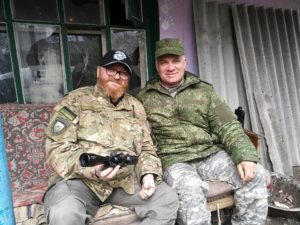
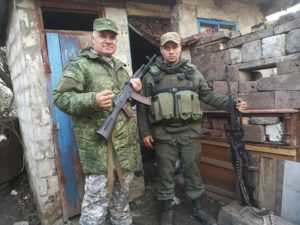
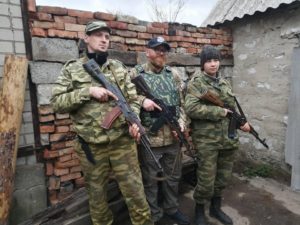
«Elpis» is not the first attempt to create a pro-Russian party in Cyprus. In 2017, emigrants from the former Soviet Union formed a political party called “Ego O Politis”. Party leaders Alexei Voloboev and Ivan Mikhnevich regularly visited the embassy, Russian diplomats visited the party office, and Voloboev traveled to Moscow where he met with Vyacheslav Volodin, Vladislav Surkov, Leonid Slutsky, and other politicians.
Cyprus Daily News editor-in-chief Boris Demache infiltrated the party in early 2019 under the guise of a supporter and attended political council meetings for four months. According to him, the party leaders coordinated all their actions, statements, interviews, and participation in some events with the embassy. Several times Voloboev appeared in the company of the first secretary of the embassy Eugene Shkolyar, whom he characterized as a deputy resident of the FSB in Cyprus. The party’s program was agreed upon several times at the embassy, Demash says, and Voloboev asked the ambassador several times for funding for the party. To secure Greek-Pontian votes for the party, he traveled to Moscow to the presidential administration to seek support from Greek-born businessman Ivan Savidis. Voloboev was introduced to the contents of secret documents at the embassy, which he told the party’s political council. The party’s IT support was physically located in Russia, and to change the password on the computer, they had to call Moscow. At the political council, the party leaders said in direct text that they would pursue a pro-Russian policy in parliament. The party ceased to exist in 2021 after exposés in the Cyprus Daily News.
In January 2024, Dimitri Apraksin, chairman of the Cyprus CCRC, announced his intention to run for the European Parliament from the marginal Cypriot party “Active Citizens-United Cyprus Hanters”(just over a thousand votes in the 2021 elections), relying on the support of Russian voters. Considering that in small Cyprus the number of votes cast for even the largest parties does not exceed 20 thousand, mass and controlled participation of Russian voters in elections can turn any marginal party into a large and successful one. Buying small parties and movements, both right-wing and left-wing, is an old practice of Russian intelligence services around the world.
The Communist Party of Cyprus AKEL, the second largest party in the Cypriot parliament, is considered friendly to Moscow: in 2016, for example, it secured a resolution to lift sanctions against Russia. The draft resolution was discovered in the hacked correspondence of Russian media technologist Sargis Mirzakhanyan.
Some friendly ties with Cypriot politicians date back to the Soviet era, at the expense of the USSR’s alumni communities. The Cyprus Association of Graduates of Soviet and Russian Universities, which emerged back in 1986 and unites about 2000 people, operates in Cyprus. It works under the wing of the World Association of Graduates of Soviet and Russian Universities, created with the participation of Rossotrudnichestvo.
The president is Anastasios Kouzalis, a physicist who graduated from the Patrice Lumumba Institute in 1976 and completed his postgraduate studies there in 1978. In Cyprus, Kouzalis held important positions in the Ministry of Education. The Society of Friendship and Cultural Relations «Cyprus — Russia» is headed by another graduate of the Patrice Lumumba Institute from 1967, former Minister of Communications and Public Works of Cyprus (2004-2007), Chairman of the Board of the Association of Engineers and Architects of Cyprus Harris Trassou. Kouzalis and Trassou are regular participants in propaganda events organized by the Embassy and the Russian House.
Moreover, Russia has been able to influence the national educational process. In June 2023, the Cypriot Ministry of Education decided not to use in the Greek language exam for high school students in private and public schools a text taken from an article by the famous American economist Paul Krugman entitled «Why Wars are Waged». The students were asked to analyze the text, which contained such language as attempts by Russian authorities to «overthrow the government in Ukraine and seize most of its territory.» The TASS report said that the ministry was contacted by the publication’s correspondent after complaints from parents of Russian-speaking children, and the head of the Coordination Council of Compatriots Dmitry Apraksin commented on the ministry’s decision. Some parents may have indeed contacted the TASS correspondent to complain about the text in the exam, but it is far more likely that this is a clear example of Moscow’s interference in Cyprus’ internal affairs.
***
The study of Russian influence in Cyprus illustrates exactly how Russian intelligence services work with the diaspora and local politicians — and what results this leads to. Despite the sanctions, cooling relations with the EU, and Russia’s isolation, Cyprus is not seeking to get rid of Russian agents and does not interfere with their work, even though on a small island with a large Russian-speaking population, the Kremlin’s influence is as visible as the palm of its hand.
Dmitry Khmelnitsky

